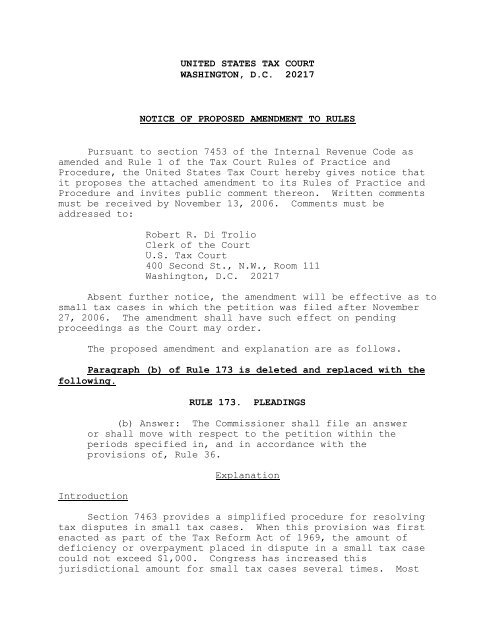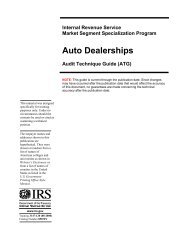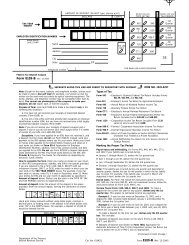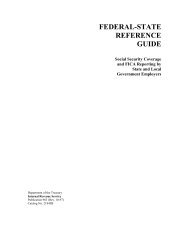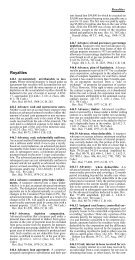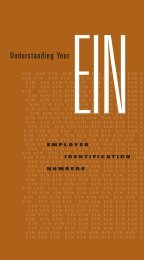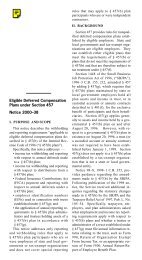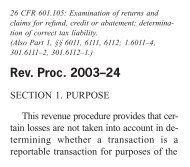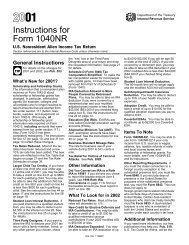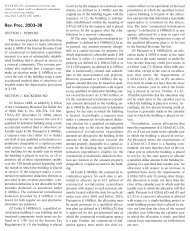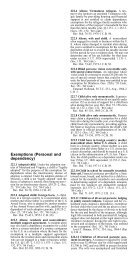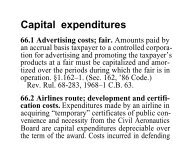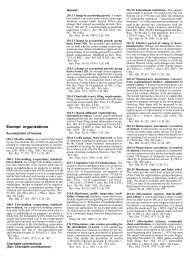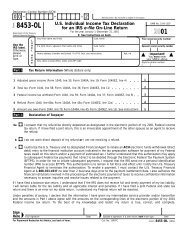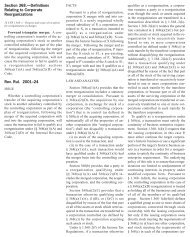NOTICE OF PROPOSED AMENDMENT TO RULE 173
NOTICE OF PROPOSED AMENDMENT TO RULE 173
NOTICE OF PROPOSED AMENDMENT TO RULE 173
Create successful ePaper yourself
Turn your PDF publications into a flip-book with our unique Google optimized e-Paper software.
UNITED STATES TAX COURT<br />
WASHING<strong>TO</strong>N, D.C. 20217<br />
<strong>NOTICE</strong> <strong>OF</strong> <strong>PROPOSED</strong> <strong>AMENDMENT</strong> <strong>TO</strong> <strong>RULE</strong>S<br />
Pursuant to section 7453 of the Internal Revenue Code as<br />
amended and Rule 1 of the Tax Court Rules of Practice and<br />
Procedure, the United States Tax Court hereby gives notice that<br />
it proposes the attached amendment to its Rules of Practice and<br />
Procedure and invites public comment thereon. Written comments<br />
must be received by November 13, 2006. Comments must be<br />
addressed to:<br />
Robert R. Di Trolio<br />
Clerk of the Court<br />
U.S. Tax Court<br />
400 Second St., N.W., Room 111<br />
Washington, D.C. 20217<br />
Absent further notice, the amendment will be effective as to<br />
small tax cases in which the petition was filed after November<br />
27, 2006. The amendment shall have such effect on pending<br />
proceedings as the Court may order.<br />
The proposed amendment and explanation are as follows.<br />
Paragraph (b) of Rule <strong>173</strong> is deleted and replaced with the<br />
following.<br />
<strong>RULE</strong> <strong>173</strong>. PLEADINGS<br />
(b) Answer: The Commissioner shall file an answer<br />
or shall move with respect to the petition within the<br />
periods specified in, and in accordance with the<br />
provisions of, Rule 36.<br />
Introduction<br />
Explanation<br />
Section 7463 provides a simplified procedure for resolving<br />
tax disputes in small tax cases. When this provision was first<br />
enacted as part of the Tax Reform Act of 1969, the amount of<br />
deficiency or overpayment placed in dispute in a small tax case<br />
could not exceed $1,000. Congress has increased this<br />
jurisdictional amount for small tax cases several times. Most
-2-<br />
recently, the Internal Revenue Service Restructuring and Reform<br />
Act of 1998 increased the amount to $50,000, effective July 22,<br />
1998, and provided additional categories of small tax cases.<br />
In certain instances, a small tax case proceeding may be<br />
discontinued; the case is then conducted under regular<br />
procedures. See section 7463(d). The conference committee<br />
report to the Internal Revenue Service Restructuring and Reform<br />
Act of 1998 states:<br />
the conferees anticipate that the Tax Court will<br />
carefully consider (1) IRS objections to small case<br />
treatment, such as objections based upon the potential<br />
precedential value of the case, as well as (2) the<br />
financial impact on the taxpayer, including additional<br />
legal fees and costs, of not utilizing small case<br />
treatment. [H. Conf. Rept. 105-599, at 245 (1998),<br />
1998-3 C.B. 747, 999.]<br />
From the enactment of section 7463 in 1969, until May 1,<br />
1979, pleadings requirements in small tax cases and regular cases<br />
were identical. Effective May 1, 1979, the Court amended former<br />
Rule 175(b) to generally eliminate the requirement that the<br />
Commissioner file answers in small tax cases. The note to this<br />
1979 amendment states:<br />
Par. (b) of this Rule is amended to change the<br />
existing requirement that the Commissioner file an<br />
answer to the petition in all small tax cases. Under<br />
the new provision, the general rule is that the<br />
Commissioner need not file an answer in such cases,<br />
unless there is matter on which he has the burden of<br />
proof, as, for example, where he relies on an<br />
affirmative defense or the determination of fraud on<br />
the part of the petitioner. However, even though not<br />
required to do so, the Commissioner may file an answer<br />
if he so desires.<br />
The experience of the Court under its preexisting<br />
procedure has shown that the filing of answers in all<br />
small tax cases has not been helpful in the disposition<br />
of such cases and has resulted generally in merely<br />
calling for unnecessary additional paperwork,<br />
particularly in the light of the fact that most of<br />
these case are actually disposed of without trial.<br />
Furthermore, the Commissioner has assured the Court<br />
that, in the relatively small number of cases expected<br />
to be tried, he will file with the Court and serve upon
-3-<br />
the petitioner an informative statement amplifying the<br />
matters in dispute that are to be adjudicated.<br />
[71 T.C. 1212.]<br />
Current Rule <strong>173</strong>(b) is identical to former Rule 175(b). It<br />
provides:<br />
(b) Answer: No answer is required to be filed in<br />
a small tax case, except where there is an issue on<br />
which the Commissioner bears the burden of proof or<br />
where the Court otherwise directs. Where an answer is<br />
filed, the provisions of Rule 36 shall apply. In a<br />
case where no answer is filed, the allegations of error<br />
and facts relating thereto set forth in the petition<br />
shall be deemed denied.<br />
Discussion<br />
Small tax cases now comprise about half the Court’s docket.<br />
Petitioners in small tax cases are increasingly represented by<br />
low income taxpayer clinics, which in recent years have<br />
proliferated, partly because of funding provided by legislation.<br />
The parties as well as the Court would benefit from improved<br />
pretrial communication between the parties in small tax cases.<br />
Because current rules generally do not require the<br />
Commissioner to file answers in small tax cases, petitioners and<br />
low income taxpayer clinics have sometimes had difficulty in<br />
identifying and contacting, until shortly before trial, the IRS<br />
attorney responsible for a case. Requiring the Commissioner to<br />
file answers in all small tax cases will provide petitioners or<br />
their counsel the name, address, and telephone number of the IRS<br />
attorney responsible for the case well before trial. This<br />
information should facilitate essential pretrial communication<br />
between the parties, encourage earlier consideration of small tax<br />
cases by the appropriate IRS attorney, and reduce instances in<br />
which the parties and the Court are surprised by 11th-hour<br />
procedural and jurisdictional motions.<br />
In addition, small tax cases move through the administrative<br />
system relatively quickly and may present novel issues resulting<br />
from changes in the tax law. The filing of answers may promote<br />
earlier identification of such issues and assist the Court in<br />
making informed and timely decisions as to whether it might be<br />
appropriate to discontinue small tax case proceedings in<br />
particular instances, pursuant to section 7463(d). It is not<br />
anticipated that the proposed amendment will result in any
-4-<br />
significant delay in the calendaring of small tax cases for<br />
trial.<br />
Accordingly, the Tax Court proposes to amend its Rule <strong>173</strong>(b)<br />
to require the Commissioner to file answers in all small tax<br />
cases. The time periods within which to answer or move with<br />
respect to the petition, the form and content of the answer, and<br />
the effect of the answer will be as provided in Rule 36.


